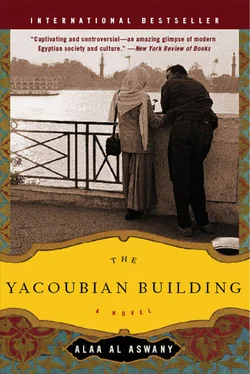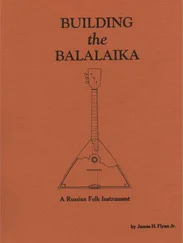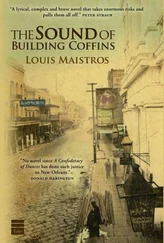Alaa Al Aswany - The Yacoubian Building
Здесь есть возможность читать онлайн «Alaa Al Aswany - The Yacoubian Building» весь текст электронной книги совершенно бесплатно (целиком полную версию без сокращений). В некоторых случаях можно слушать аудио, скачать через торрент в формате fb2 и присутствует краткое содержание. Год выпуска: 2006, ISBN: 2006, Издательство: Adobe Acrobat eBook Reader, Жанр: Современная проза, на английском языке. Описание произведения, (предисловие) а так же отзывы посетителей доступны на портале библиотеки ЛибКат.
- Название:The Yacoubian Building
- Автор:
- Издательство:Adobe Acrobat eBook Reader
- Жанр:
- Год:2006
- ISBN:978-0-06-087813-9
- Рейтинг книги:5 / 5. Голосов: 1
-
Избранное:Добавить в избранное
- Отзывы:
-
Ваша оценка:
- 100
- 1
- 2
- 3
- 4
- 5
The Yacoubian Building: краткое содержание, описание и аннотация
Предлагаем к чтению аннотацию, описание, краткое содержание или предисловие (зависит от того, что написал сам автор книги «The Yacoubian Building»). Если вы не нашли необходимую информацию о книге — напишите в комментариях, мы постараемся отыскать её.
The Yacoubian Building — читать онлайн бесплатно полную книгу (весь текст) целиком
Ниже представлен текст книги, разбитый по страницам. Система сохранения места последней прочитанной страницы, позволяет с удобством читать онлайн бесплатно книгу «The Yacoubian Building», без необходимости каждый раз заново искать на чём Вы остановились. Поставьте закладку, и сможете в любой момент перейти на страницу, на которой закончили чтение.
Интервал:
Закладка:
“The doctor? Is everything all right?”
“I wasn’t feeling well.”
“I’m sorry.”
She laughed loudly and said, “No. It turned out to be a good sickness.”
“I don’t understand.”
“Congratulations, my darling. I’m two months pregnant.”

The big van stopped in front of the Yacoubian Building. It was completely closed apart from a few small wire-covered openings. The soldiers led Taha out, beating him and kicking him with their huge boots, and before pushing him inside the van, they put a tight blindfold over his eyes. They pulled his hands behind his back and put them in handcuffs, and he felt his skin break under the pressure of the steel. The van was crowded to the utmost with detainees, who throughout the journey kept up a constant chant of “There is no god but God! Islamic… Islamic.!” as though through their cries they might get the better of their fear and tension.
The soldiers let them chant, but the van drove at top speed so that more than once the students fell down on top of one another. Then it stopped suddenly and they heard the grating of an ancient iron gate and the van moved forward slowly for a little. Then it stopped again, the back door was opened, and a troupe of soldiers shouting insults burst in on them. They had taken off their boots and used these to beat the students, who fell from the van screaming. Next, they heard the barking of police dogs, which quickly fell upon them. Taha tried to get away by running, but a huge dog pounced on him, pulled him to the ground, and started snapping at his chest and neck with its teeth. Taha turned over where he lay to protect his face from the dog’s fangs. It occurred to him that they wouldn’t let the dogs kill them but that if he did die he would go to Paradise. He hung on and started reciting verses from the Qur’an under his breath and thinking of bits from the sermons of Sheikh Shakir. He discovered that his bodily pain would reach a certain peak, which was terrible, but that after that his awareness of it would slowly diminish.
The dogs suddenly went away as though at a signal and they remained lying in the courtyard for a few minutes. Then the soldiers launched a new round of vicious beating, after which they started to lead them away one by one. Taha felt that he was being pushed down a long corridor. A door opened and he went into a large room full of cigarette smoke. He could make out the voices of seated officers, talking and laughing normally among themselves. One of them came up to him, struck him hard on the back of his neck, and shouted in his face, “What’s your name, momma’s boy?”
“Taha Muhammad el Shazli.”
“What? I can’t hear you.”
“Taha Muhammad el Shazli.”
“Louder, you son of a bitch!”
Taha shouted at the top of his voice, but the officer slapped him and asked him again. This was repeated three times. Then blows and kicks poured down on him till he fell to the ground. They pulled him up and for the first time a deep, quiet voice arose, speaking confidently and slowly — a voice that Taha would never forget.
“Enough, boys. That’s enough beating. The lad looks sensible and intelligent. Come here, lad. Come closer.”
They pushed him in the direction of the source of the voice, who Taha was sure must be their boss and must be sitting at a desk in the middle of the place.
“What’s your name, lad?”
“Taha Muhammad el Shazli.”
He spoke with difficulty and could feel the acrid taste of blood in his mouth. The boss said, “Taha, you look like a good kid and from a decent family. Why are you doing this to yourself, son? See what’s happened to you? And that’s nothing. You still haven’t seen a thing. You know those soldiers? They’ll keep beating up on you till nighttime, then they’ll go home to eat and sleep and other soldiers will beat you till the morning. And in the morning, the soldiers who went home will come back and beat you again till nighttime. You’ll go on that way forever, and if you die from the beating, we’ll bury you here, right where you’re standing. It makes no difference to us. You’re not a match for us, Taha. We’re the government. Are you a match for the government, Taha? See what a mess you’ve got yourself into, Taha? Listen, kid. Would you like me to let you out right now? Would you like to go home to your folks? Your mum and dad must be worried by now.”
He spoke the last sentence as though he was genuinely upset. Taha felt a great shudder go through his whole body. He tried hard to hang tough but failed and a high-pitched sound like the howl of an animal escaped from him. Then he abandoned himself to a hot, uninterrupted bout of weeping. The officer came over to him and patted his shoulder, saying, “No, Taha. No lad, don’t cry. I swear to God I really feel sorry for you. Listen, there’s a good boy. Just give us some information about your organization, and I swear on my honor I’ll let you go right now. What do you say?”
Taha shouted, “I don’t have an organization!”
“So why do you keep a copy of the Islamic Action Charter?”
“I was reading it.”
“Son, that’s organization literature. Out with it, Taha, like a sensible lad. Tell us what your responsibilities are in the organization.”
“I don’t know any organizations!”
The blows rained down anew and Taha felt that his pain had gone beyond its terrible peak once more, turning into something more like an idea that he grasped from the outside. The officer’s voice came to him, as quiet as ever, “What are you trying to do to yourself, sonny? Just say what you know and get yourself out of this.”
“I swear to Almighty God, sir, I don’t know anything.”
“It’s up to you. I can’t help you if you won’t help yourself. Just remember I’m the only good one here. Those other officers are unbelievers and criminals and they don’t just beat, those guys do really nasty things. Do you want to talk or not?”
“I swear to Mighty God, I don’t know anything.”
“Okay. It’s up to you.”
As though this were a secret signal, no sooner had the officer finished saying the words than the blows rained down on Taha from all sides. Then they threw him facedown on the ground and several hands started to remove his gallabiya and pull off his underclothes. He resisted with all his might, but they set upon him and held his body down with their hands and feet. Two thick hands reached down, grabbed his buttocks, and pulled them apart. He felt a solid object being stuck into his rear and breaking the tendons inside and he started screaming. He screamed at the top of his voice. He screamed until he felt that his larynx was being ripped open.

With the coming of winter Abduh started his new life.
His national service term with Central Security came to an end and he took off his military uniform, forever swapping it for Western clothes, and he started work at the new kiosk. It wasn’t long before he sent for his wife Hidiya and his son Wael, who was still a babe in arms, to come from Upper Egypt. They lived together in a room on the roof of the Yacoubian Building that Hatim Rasheed rented for them. Abduh’s health improved, he put on weight, and he seemed settled. Having lost the miserable, underfed appearance of the conscript, he looked more like a successful young Cairo shopkeeper full of self-confidence and energy (even though he kept his heavy Sa’idi accent, his nails remained long and dirty, and his teeth — which he never brushed — continued to be stained yellow with cigarette smoke and the accumulated effects of food). He made a reasonable income selling cigarettes, candy, and soft drinks and the people of the roof accepted him and his family just as they did any new neighbor, with a welcome shrouded in reserve and curiosity. As the days passed, however, they came to like Abduh’s wife Hidiya with her trim, slim figure, her black gallabiya, her dark complexion, the dark tattoo beneath her chin, her Sa’idi dishes (millet bread and okra), and her Aswan accent that they loved to imitate.
Читать дальшеИнтервал:
Закладка:
Похожие книги на «The Yacoubian Building»
Представляем Вашему вниманию похожие книги на «The Yacoubian Building» списком для выбора. Мы отобрали схожую по названию и смыслу литературу в надежде предоставить читателям больше вариантов отыскать новые, интересные, ещё непрочитанные произведения.
Обсуждение, отзывы о книге «The Yacoubian Building» и просто собственные мнения читателей. Оставьте ваши комментарии, напишите, что Вы думаете о произведении, его смысле или главных героях. Укажите что конкретно понравилось, а что нет, и почему Вы так считаете.












